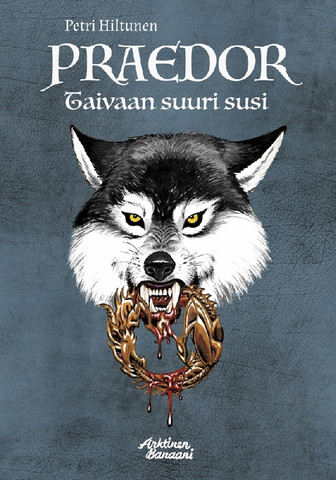Entries sorted by date:
30-Nov-2016
14-Nov-2016
16-Oct-2016
03-Oct-2016
13-Sep-2016
09-Sep-2016
05-Sep-2016

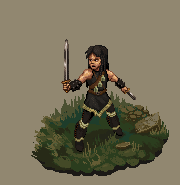 30-Nov-2016: Shadows of
Warth
30-Nov-2016: Shadows of
Warth
(suom. kään. "Warthin Varjot")
I am travelling soon (18+ hours in an airplane,
gaah). But I'll be back, hopefully with the first
two chapters of my next Praedor novel Verivartio
in my pocket. And when I do, I will also be
starting another series of Praedor RPG
adventures I have named Warthin Varjot
(lit. "The Shadows of Warth"). This is for A) the
benefit of an old acquaintance who could really
use a pick-me-up and B) playtesting the legion of
new monstrosities from Kirottu Kirja.
Hopefully the treasure system as well, as soon as
I get there. I am still stuck at the undead
tables, as corny as that sounds.
Warth is a really interesting shard in the
caleidoscope that makes up Jaconia. It is an ugly
scar, a kindom-sized ruined city a mere day's
travel north of Farrignia, the mightiest city in
Jaconia today. In fact, Farrignia only became so
mighty because it was the gate between the ancient
realms of Tulath and Warth. When Kirel Curarim,
the Sorcerer King of Warth, threw caution to the
winds and sought to reclaim the glory that had
been Old Borvaria, the high and mighty from Tulath
often abandoned their court to bask in the glory
of Warth's ascension. What exactly went wrong
there in -37 V.a. is subject to debate. The common
wisdom says Warth repeated the sins of Old
Borvaria and therefore suffered the same fate.
Whatever the case, the other Sorcerer Kings
entered the dying city with their armies, scourged
all life with witchfire and forced shut the
breaches between the worlds. It was a feat of
sorcery no living sorcerer today could match.
Perhaps there is a lot a truth in the
conventional view. Still, I am intrigued by
something that renegade sorcerer Viras Edares
uttered in Kuolleen Jumalan Palvelija
(lit. "Servant of The Dead God"). He said:
"Warth could have been the herald of a new age, if
small-minded idiots had not intervened!"
Indeed, for everyone else in Jaconia, the Old
Warth must have seemed like a paradise. The
sorcerers were free from the restrictions placed
on the use of magic and interacted freely with
alien worlds. Slavery for mortals was abolished
and in less than a century, they had been made
immortal, exhibiting magical powers of their own
and were on a near-equal standing with the actual
sorcerers. Since magic catered to every need,
there was no want for food or water, no hard
labour and immortality had made the concept of
disease obsolete. The rest of the world probably
did not know about Curarim's experiments with
demonic hybrids, but given what else the Sorcerer
Kings were experimenting with at the time, that
actually doesn't sound too bad. The claim
about Warth falling to the ravages of wild magic
may well be true, but I think the other Sorcerer
Kings were worried about Curarim's changes to the
social order and the erosion of their own power.
When the opportunity to finally stomp on it came,
they did so with relish.
In the end, the results were mixed. Warth was
silenced but its fall triggered the chain of
events that eventually led to the Jaconian Civil
War, the downfall of the Sorcerer Kings and the
decimation of sorcerers as a whole. When the smoke
cleared, no living sorcerer had ever seen Old
Borvaria with his own eyes, nor did know the
ancient magic that had once saved Jaconia from
Borvaria's fate.
In Salaisuuksien kirja, I extrapolated on
all these hints by making Old Warth the cradle and
source of witchcraft in Jaconia. By introducing
them to demonic magic, Curarim gave mortals access
to supernatural powers and neither the Sorcerer
Kings nor their mortal successors could take it
away. Even now, arcane artifacts, scrolls of
demonic lore and copies of wall writings from
Warth are eagerly sought after, and not just by
heretical cults: even many sorcerers chafe at the
restrictions the Council of Circol has placed on
magical research.
Today, the surface of Warth is quiet, scorched and has few monsters beyond critters small enough to hide in cracks. However, beneath the blackened stones are secret corridors of ancient palaces, arcane laboratories of mighty sorcerers, forgotten doorways into strange worlds and gloomy dungeons built for men, beasts and demons alike. When the city above burned with the heat of a sun, it was here that the warped life and the restless dead took refuge. No one knows what became of them. The ruins were later picked clean by the early praedors but entrances to underground sanctuaries were near impossible to find. Many of them lie untouched to this day.
In Shadows of Warth, a cabal of merchants
from the Street Of Wonders has put together what
scraps of information, maps and ancient clues they
have on these as-of-yet undiscovered treasures.
Armed with this knowledge, they intend patron a
troupe of skilled praedors to recover them. It is
risky, it is dangerous and it will send heretical
cults, secret societies, ambitious sorcerers and
the Black Room into a frenzy. Still, the prognosis
is excellent. Compared to the distant Borvaria,
you can see the jagged edges of Warth from the
north wall of Farrignia on a clear day. What could
possibly go wrong?
And with that, I am going to leave you for a
while.
 14-Nov-2016: The MMORPG
Format
14-Nov-2016: The MMORPG
Format
I confess. Desperate for something like Witcher
3 or Skyrim, I did try out Elder
Scrolls Online. And oh boy, did that
experiment blow up in my face. In truth, now that
it's had the One Tamriel -update the ESO
is no longer the unmitigated disaster it was at
launch. The biggest change is the autoleveling of
the world, which effectively fixed much of the
broken exploration. Without that exploration fix,
I would not have bothered. The game has always had
a semi-functional first-person view, although the
lack of mass (characters and enemies can pass
right through each other) makes it awkward. The
movement controls are functional, even if they
feel Oblivion-level stiff and unnatural,
where as Skyrim felt fluid and intuitive. In
short, not good but workable. None of these things
is a deal-breaker. So what went wrong?
It's the MMORPG format where my immersion falls flat on its face. How hard can it be to give an MMO even a half-assed a-life system? Or even idle animations that would make some fucking sense? Instead, we've got monsters standing around or sometimes moving between A and B without rhyme or reason. Then a rush of players with names like "XE¤GERFGEF0005" rush through the area. Some monsters get killed. Others pursue them for a short while, stopping at an invisible line on the ground and turn around. Those killed fade away and rematerialize, alive and well, out of thin air. Then I am told to kill some evil dude but lucky for me, he has already been killed and the mission can be completed by looting his corpse. But I spent a little too long exploring his surroundings for hidden chests, so he congealed back into life out of thin air and attacked me. Fortunately, he can't leave the chamber; so I could outrun him by walking.
Standard MMORPG fare, right? What was I
expecting, you might ask, and you'd be right. I
was stupid to expect anything more. But I know for
a fact things don't have to be like this. It is
not written in stone that an MMORPG world has to
be broken, unbelievable and internally
inconsistent. I know this. I have played EVE
Online.
While MMORPGs are stuck, Kirottu Kirja
creeps forward. I am now in the most difficult but
also the most rewarding part of the supplement. At
the heart of KK are two tables: Location and
Hazard. Everytime the Gamemaster needs to know
what kind of a place the players are in, the
location table is your friend (also determinable
by cards). Each location includes a number of
potential local hazards. The hazard table is the
next port of call but not all hazards are equal.
While there are probabilities in play and the GM
can skew the results by place, you can walk into
an ancient temple and find that your backpack has
been holed by a small herbivorous critter with a
taste for Jaconian canvas. Or you are strolling
down a rubble-strewn street minding your own
business and suddenly a crossbreed between a t-rex
and a box jellyfish peeks its head around the
corner. You will get a truckload of new monsters
with this book and the old ones are getting
massive boosts: multiple attacks, more effective
defenses, powerful special properties, strength in
numbers and a damage upgrade.
Too much? Well, you don't have to outrun the
monster, just someone else in your party.
And when out in the Cursed Lands, always have a
plan to flee or kill anything you meet. Because
everything you'll meet has a plan to kill or flee
you.
P.S.
Nite just reviewed
Praedor RPG, 16 years after its
publication. And the review is in English.
 16-Oct-2016: The Sequel,
For Real
16-Oct-2016: The Sequel,
For Real
My publisher has asked (and my friends echo) for a
sequel to Käärmetanssija. Truth to be told,
the idea for it popped into mind already when
writing this novel. I've now decided the sequel is
going to happen, or at least I am going to give it a
jolly good go. What I am hoping for is that it
starts snowballing, crushing all resistance and
procrastination before it like Käärmetanssija
did. I am going to Guadalajara in Mexico in December
and will be attending the Guadalajara
International Book Fair (no, I didn't
plan the timing but sometimes I get lucky). Starting
on Verivartio sounds like the perfect
post-convention and evening activity, don't you
think? Even though there is not a drop of ink on paper yet (well, the writing process is all digital but humor me), it took a fair bit of planning to get even this far. Käärmetanssija is set, very loosely, in the aftermath of a Praedor roleplaying campaign "LootEm" that was played in 2001-2004, although the novel has scant reference to it. The sequel will be set in the aftermath of Petri's new comic book Taivaan suuri susi. Reading Käärmetanssija won't be necessary to get good mileage out of the sequel but knowing what happened in TSS would be helpful. It's also a canon and a branding thing. Unlike with Käärmetanssija, I have actually run a roleplaying campaign in this setup before (Verivartio, 2011-2015). There are upsides and downsides to that. While I will probably name the sequel as "Verivartio" (lit. "Blood Guard", I really like the name), it has to be a stand-alone story, independent from the campaign. Same circumstances exist in the beginning but it will be a different story, even if my players will recognize some of the places, characters and other cool bits.
Käärmetanssija wasn't just about telling what happens to a 14-year old girl. I was pushing against my own creative boundaries, especially regarding the portrayal of emotions. My protagonist was about as far removed from myself as is physically possible and now I had to make sense of her and describe her emotions, motivations and personal struggles. I am particularly proud of Nejah's internal conversation while waiting for her turn in Vihreä Malja. That said, I am not a subtle writer and pulp fantasy is not a subtle genre. Whenever the opportunity presented itself, I seized it with both hands at the risk of being melodramatic. Käärmetanssija never shied away from tears, heartache or anguish. Not once. This touchy-feely stuff was a new frontier for me (especially after the stone-cold and borderline sociopathic Jacob Moncke in The Hollow Pilgrim) but I think the novel is better for it. Critics seem to agree: four-plus stars out of five is my best scoring average yet.
If the emotional frontier has now been conquered (yeah, right!), what's next? In the sequel, I want to push back the boundaries of epic. Praedor as a whole has a reputation of being down-to-earth mud-encrusted low fantasy. People occasionally tell me it is not fit for anything else. Fuck that! Also, I was a little upset that so few other people could recognize how Taivaan suuri susi left Jaconia teetering on the brink of an abyss. Now I have a chance to prove that as well. Finally, Petri himself compared Käärmetanssija to Game of Thrones, even though the novel only features political squabbles and family woes within the mercantile class of a single Jaconian city-state! He meant it as a compliment but I will take it as a challenge. I will rise to it and show you what high-level power games are like in Jaconia. Or crash and burn while trying.
This is so "Verivartio".
When writing a book and even after having the idea for the story arc, the beginning is always a problem for me. I have to start small enough as to not overwhelm the reader, yet big enough to keep him interested. Finally, I have to start in a way that inspires me to go on and gets that snowball rolling. It took me a good while to figure out how I want to Verivartio to begin. But now I know and that is the chapter I am going to write in Mexico.
 03-Oct-2016: Comedy Is
Weird?
03-Oct-2016: Comedy Is
Weird?
Well, that was awkward. 15 minutes
into our Saturday morning signing session at Turku
Fantasiapelit, the store had literally run out of
stuff for us (me and Petri) to sign. Our delight at
this great triumph was tempered by the fact that the
store only had single copies of Käärmetanssija,
Taivaan suuri susi and Salaisuuksien kirja.
The first customer to walk in bought the lot,
although Petri then took the store inventory into
the negative by selling one of his author's copies
of TSS. We twiddled our thumbs for an hour, although
the customer who bought all three was eager to chat
about all things Praedor, so it wasn't a total loss.
He was also a big fan of Sami Koponen's Efemeros
#2 material for Praedor RPG, so credit where
credit is due. Also, he was under the impression
that Salaisuuksien kirja was about some old
material that was already part of the 1.1. version
of the rulebook. We did set him straight but I
almost burst out in tears when he first said that.
Petri stayed on for Sunday. I headed
home and today met Marko Laine, the cover artist for
Salaisuuksien Kirja. He will do also the
cover for Kirottu Kirja and a variable
number of internal illustrations. Because of reasons
(well, the Borvaria Adventure Deck, as at least some
of those card pics will end up used here as well), Kirottu
Kirja won't have a strictly black-white
interior art. We'll have to see where this visual
adventure will take us but on the whole, the
illustration side for Kirottu Kirja
is now covered. If you buy it the way you bought Salaisuuksien
Kirja, I can afford to increase the art budget
a little :)
The topic refers to a conversation
that followed our agreement. Marko had of course
read Käärmetanssija (I insisted it, since it
contains a good example of my vision of Borvaria)
and told me he loved it. Don't they always? But then
he stunned me by expressing his surprise at how
"comedic" the book was. I was bewildered when my
publisher first described it as "humorous" and now
Marko agreed with them, stating (or at least that's
the impression I got) that the book had an
"abnormal" level of comedy to it. Are they right? Is
the book abnormal because whenever I saw an
opportunity for funny scene, I usually took it? Even
with all the graphic violence and tragic themes
running through the story?
Dumas for the characters, Howard
for the action!
My biggest literary idols are
Alexander Dumas and Robert Edwin Howard. Three
Musketeers (by Dumas) is absolutely loaded
with funnies, despite the overall story being quite
tragic and ending at an almost sad note. And with
Howard, the better his inspiration for the story
was, the more humor he managed insert into it. My
absolute favorite story by Howard, a historical
short story called Shadow of Vulture, is a
textbook example of the roguish tone I was going
for, but the better Conan stories also stand out
because they manage vary their tone between comedy,
tragedy, action and horror. I like to think I have
improved as a writer since 2004 but this mixture of
light and dark tones was already my goal in Vanha
Koira and should be evident all through The
Hollow Pilgrim.
To me, funny scenes and variations of tone make the story more colorful, the characters more believable (hell, it even made a sociopath like Jacob Moncke someone you could empathize with) and the world more vivid. It is even realistic, as funny and slightly embarrassing things happen to us all the time. But while I can cite a vast number of foreign fantasy works in my defense (and that includes Tolkien), it is true that most of the Finnish fantasy I've read is dead serious in tone. Is this a Finnish thing, the assumption (or fear on the part of the author) that lightening the tone cheapens the work? That a story can't be epic or moving if we crack a smile while reading it? Personally, I find that occasional comedy heightens the drama rather than detracts from it and it is all part of the pacing! Damn, I have to regain my composure. Here is some relaxing and very serious classical music from the very serious royal courts of the late 18th century:
This is not a comment on Käärmetanssija, but period criticism towards the works of Aleksis Kivi (1834-1872), our national author. He applied humor to his description of the nature and habits of the Finnish peasantry and his contemporaries, gripped by national romanticism, pilloried him for "mockery". They essentially killed by him with poverty, depression and starvation. I'll probably avoid starvation but it seems that the aversion to humor in Finnish fiction has really long roots.
 13-Sep-2016: TSS
Aftermath
13-Sep-2016: TSS
Aftermath
I got my hands on the script for Taivaan
suuri susi already back in 2011 and have
been advertising it as something that moves the
history of Jaconia forward. On top of that, I have
been simply salivating over the new opportunities
for years: there was material in the story
aftermath for two new world supplements and
Erkka's brainwave in the Tampere #praedor-meet
just increased that number to three. The whole Verivartio
Campaign was based on that situation and the
very actions taking place on the last page.
To hear someone now claim that nothing has changed
and even the queen was "Meh, back to the business
as usual" in the end is, well, exasperating. How
do I debate a nonsensical argument? How do I
overcome a statement so detached from objective
reality (or ink on paper, in this particular
case). The album ends with a *huge* gorilla in the
room and GRR Martin would get four novels out of
it. Or more precisely, the room has a
gorilla-shaped hole in it and the realms and
dynasties of Jaconia are circling it as if caught
in a whirlpool.
It has happened in the real world. The
consequences of the most obvious historical
analogue have often been referred to as the "first
true world war". I find it hard to accept that I
am the only one who thinks it is staring me in the
face from that story. Maybe it is the presence of
barbarian hordes in the story that confuses
people? Remove them from the equation and stop
thinking about the fall of Rome, then consider the
state of affairs at the end of the album and
finally take a hint of what actually happens on
that last page. For the record, Jaconia turned out
to be more fortunate than Europe ever was. From Exitus,
the story of Ferron's death, we know that an
all-out Jaconian war was avoided. This became the
premise of Verivartio Campaign for
four years: how could Jaconia avoid the fate that
befell on Europe? If the players had failed, we
would have broken canon. Lucky for me, they didn't
:)
I am torn.
Should I just go ahead and burgersplain what I
mean? That would be condescending as hell and Olorin
the Venerable has already suggested that I
am blinded by my own extrapolation. I obviously
disagree but that is exactly what would happen if
I were, isn't it? What if I am in the wrong, after
all? What if this gaping abyss of Jaconian
realpolitik that I think I am staring at doesn't
really exist? Tiraman's mercy, am I going insane?
Should I instead keep my peace? And possibly
return to the subject in future Praedor
supplements, should the opportunity arise (and my
inspiration last)? That would be the sensible and
patient option. I am not too good at either, I'm
afraid, and I loathe to waste good materiel. By
the time I would get to those supplements, TSS
would be old news. Honestly, it would be two years
from now at a minimum and probably more.
The third option, and the one I was already
pondering before the comic album came out, would
be to use these developments as the stage of a
praedor-themed novel. The problem is that due to
different media and goals, Verivartio the
Novel and Verivartio the Campaign
would have to be radically different. Furthermore,
I'd like my next Praedor novel also feature Nejah
as the protagonist but the whole thing hasn't
quite clicked yet. Verivartio characters
were not praedors or other landless exiles. They
were high-ranking members of the nobility and the
clergy from the Artantean Church. Despite her
birth, Nejah is neither and inserting her into a
geopolitical game of such scope and stakes is
easier said than done.
Maybe the point is moot. Maybe the abyss isn't
there, the story is going cold anyway and the
publisher doesn't even want a sequel. I was
originally going to blog today about the use of
humor in Käärmetanssija, given that the
publisher's press release calls is "humorous but
edgy". But I just had to get this aftermath thing
off my chest, sorry. Next time, maybe?
 09-Sep-2016: Release Event
Sep 14th
09-Sep-2016: Release Event
Sep 14th

In other news, stubbing your little toe when your other knee is broken is the very definition of adding insult to injury. Now it is stiff, swollen and purple (that was a surprisingly erotic description). I hope I didn't break any small bones. Balancing on those crutches is not always easy and stumbles really, really hurt right now.
In yet another news, rumors about a Praedor videogame in the works were not entirely untrue but to the best of my knowledge the project has now folded. I was sorry but not surprised to hear that. I learned something about their plans and it wasn't the first grandiose scheme suggested for Praedor. People approaching Petri about these things have a habit of biting off more than they can chew. So far, only us writers (and our associated artists) have been able to deliver. I expect Petri to remain open to all sorts of suggestions regarding to the franchise but personally, and as a game industry professional, I'd like to make a few recommendations about your proposals for "Praedor: XYZ"
- Praedor is a unique fantasy setting. Whatever you do needs to highlight at least one aspect of that. Making a generic fantasy thing and slapping the Praedor ouroboros onto it won't work.
- Bring something new to the table. New ideas are usually new recombinations of old ideas and that is fine, but "just like *latest popular thing* but with praedors" won't inspire confidence.
- Have a believable scope. When you present your idea, start small and with something you can plausibly execute. Then, if opportunities and resources allow, build up from there.
- Petri is planning a short Praedor
Creator's Guide etc. to outline the
dos and don'ts of the franchise. Until that is
done, in whatever format, I strongly advise you
to present both your concept-level idea and
later beta-draft to Petri for approval. Also,
study previous products and do understand that Salaisuuksien
kirja pushes some limits as far as they
can go. Petri is a jovial guy but Praedor
remains Praedor only by sticking to
certain restrictions, traditions and rules.
In related news, Kirottu Kirja and Borvaria Adventure Cards have made great progress over the past two weeks. But we're still in September, so what happens if they are already done around the New Year? One option is to move on to Erkka's great idea straight away. And that means it is possible there might be three new items for Praedor RPG coming out in Ropecon 2017. And possibly four, but no promises.
 05-Sep-2016: An Arrow To The
Knee
05-Sep-2016: An Arrow To The
Knee
If you've met me or even seen pictures of me lately, I am
usually sitting in a wheelchair or at the very least have a
pair of crutches on standby. My friends, relatives,
partners, clients and whatnot have been asking why. Since I
am tired of explaining it time and time again, here it is,
once and for all.In early July, Leena and myself were working at our cultivation plot down at the Helsinki-Vantaa border. I did not see a dry ditch covered by grass and stumbled into it, landing hard on my right leg, even though I didn't fall over. That evening, the right knee began to hurt and it got progressively worse, until I finally went to see an orthopedist. Initially they suspected a torn cartilage inside the knee, which would have had to be removed by surgery.
However, an MRI showed that the cartilage was fine. Instead, there was a fracture pattern at the lower end of the thighbone, against the knee. It was visible because it had filled with blood and iron in the hemoglobin formed a spiderweb of silver inside the bone. Not broken but crushed and fractured. Essentially, the ends of shinbone and the thighbone had bashed against each other and the thighbone gave way. Painful as fuck, yes, but it will heal, given time and rest. Essentially, no weight on the knee, no lower-body exercise, moving only with two crutches, wheelchair or preferably not at all. There is no surgery, cast or medication that can speed it up, although ibuprofein with its anti-inflammatory properties can help make life tolerable. Best case scenario: four weeks, but can take considerably longer.
I should know. I am about to start week seven.
There are better and worse days. On a good day, it just feels weird and the temptation to throw away the crutches is almost unbearable. Then something happens, a careless misstep, a stumble, whatever, followed by an acute, piercing or slicing pain in the knee. Bad days follow and I feel like I am back in square on with the whole fucking thing. Obesity doesn't help, of course. Some people are wheelchair-bound for life. I've been at it for six week and and I am already going insane. There aren't enough words in the dictionary to praise Leena, my spouse and companion, highly enough. She has been pushing me around through all these conventions (and the occasional evening Pokemon hunt), listening to my constant griping and going out of her way to make my existence as comfortable as humanly (and by now "inhumanly") possible. If I lived alone and had no one to help me, I don't know what I would have done.
The world sure looks different when you are in a wheelchair. If I ever end up organizing a major event again, I am going to sit down in one and attempt to reach all the rooms and service locales of the event, making sure that "accessible" means what it fucking says. My troubles with Messukeskus during Ropecon are well-documented but they were fundamentally resolvable. Tracon had its issues as well (who the fuck thought it a good idea to place the ticket sales and the main event not only far apart but at an elevation difference; or to reserve the invalid parking spots for the organizers?). As for Tampere-talo itself, whoever designed the handicapped toilets there has apparently never had so much as a limp.
Tell me, sir (and I presume it is a sir), how are you supposed to reach the special needs toilet in the back of the large men's room on the 1st floor with a female assistant? I can't even get the fucking door open and the wheels across the threshold without help from other clientele. Then there is a stand-alone special needs toilet down the hall. Ample parking space for the wheelchair besides the porcelain throne, right? Transitioning from the wheelchair onto the toilet seat means first squeezing from between the chair and the porcelain throne and then into the non-existent gap between the throne and the motherfucking sink! And the same in reverse as you leave. Obviously, anyone using a wheelchair must also be a fucking ballet dancer! I guess once the architect had moved the porcelain throne enough to the side to fit a wheelchair in this cupboard, he considered it a job well done and went to add a few of more stairs to the main hallway. There was no way for me to get into the Sopraano room. Just no way at all.
As a cherry on top, it is impossible to get out from the second or higher floors of Tampere-Talo Finnpark in a wheelchair. Just plain impossible, short of riding down the exit driveway and praying you'll hit something soft on the bottom! Even the fucking elevator is behind a small flight of stairs! I don't know if building something like that was legal even during the 80s when that fucking thing went up but sheesh! And city of Tampere, if you have to find a spot for a traffic marker, putting it into a concrete block and placing that on the only wheelchair ramp from a major parking lot to the sidewalk would not have been my first choice. But I guess four wheels and a combined mass of 200+ kilos makes us a vehicle rather than two pedestrians, so rolling down the street was just fine.
Sorry about the rant but I just had to get that out of my system. More Praedor stuff in the near future.
I promise.

PDF suomeksi
Print suomeksi
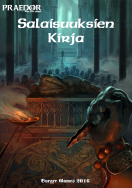
Print suomeksi
Print suomeksi
Print suom.
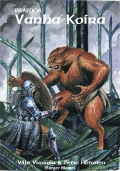
epub suomeksi
PDF suomeksi

PDF suomeksi
Print suomeksi
PDF English
Print English
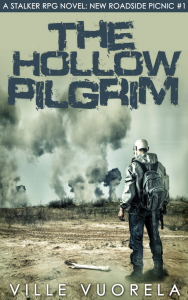
ebook English

